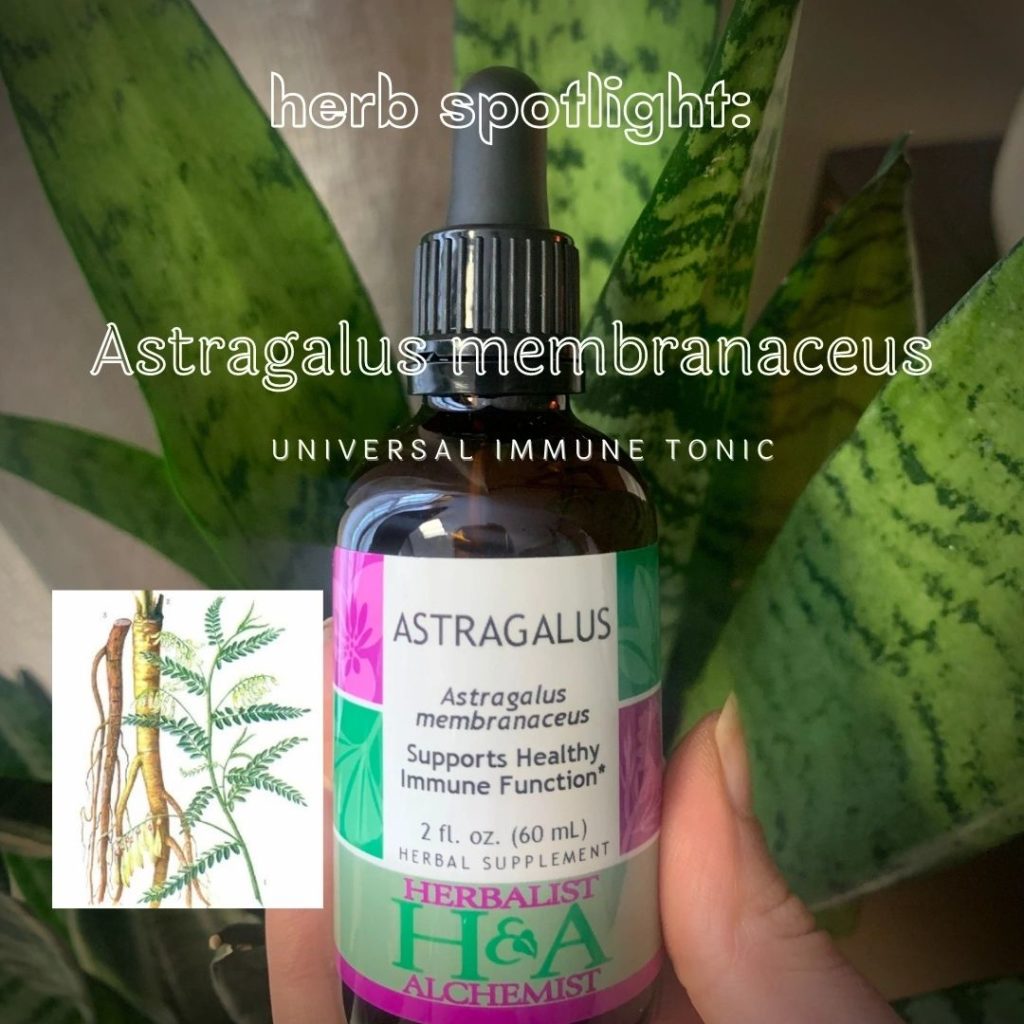Herb Spotlight: Astragalus membranaceus: Universal Immune Tonic
 Astragalus membranaceus has been used in Traditional Chinese Medicine for centuries, and since then has gained a worldwide reputation as a powerful immune tonic. Astragalus is indigenous to the Northern and Eastern areas of China, and can further be found in regions of Mongolia, as well as in North America and Europe. Astragalus is esteemed for its adaptogenic qualities in nourishing and rebuilding the body after illness, fatigue, modulating the immune response, while also keeping inflammation at bay.
Astragalus membranaceus has been used in Traditional Chinese Medicine for centuries, and since then has gained a worldwide reputation as a powerful immune tonic. Astragalus is indigenous to the Northern and Eastern areas of China, and can further be found in regions of Mongolia, as well as in North America and Europe. Astragalus is esteemed for its adaptogenic qualities in nourishing and rebuilding the body after illness, fatigue, modulating the immune response, while also keeping inflammation at bay.
There are over 2,000 species of Astragalus! Interestingly, most of these species are poisonous, with 3 main species used for medicinal benefit. Astragalus membranaceus is most commonly used in herbalism and is generally considered safe. It is also known as Huang qi, meaning “yellow leader”, referring to it’s yellow roots and flowers. Medicinally, we use the root of this plant that is harvested around four years of growth.
Astragalus has a sweet and moistening taste paired with an overall warming and circulating effect on the tissues. Those who will find most benefit from Astragalus may be experiencing an overall lack of vitality: weakness, fatigue, lack of appetite, diarrhea, extremity numbness, swelling, night sweats, frequent illness, poor digestion, or prolapsing organs.
Historically, it has been used in those with asthma as a lung tonic and modern research supports it’s benefit for hay fever over placebo.
Immune Regulation
Astragalus is considered “amphoteric” meaning it helps balance your constitution. It is supportive in activating the immune system in cases of acute illness, as well as, being able to modulate a hyperactive response such as in auto-immune diseases.
The main medicinal compounds of Astragalus membranaceus are Astragalus polysaccharides (APS), flavonoids, and saponins. Astragalus polysaccharide (APS) is the most influential constituent that improves the overall immune organ index through various mechanisms:
- encouraging the multiplying and differentiation of B and T lymphocytes
- stimulating and improving the transmission of appropriate immune signaling.
- regulate the balance of the T lymphocytes, natural killer cells, and macrophages.
- facilitating in the growth and development of dendritic cells
- anti-tumor effect by acting as the first effective regulator of tumor M1/M2 macrophage polarization. Cancer patients undergoing chemotherapy showed decreased bone marrow suppression and retained more adrenal gland function when also given Astragalus as part of treatment!
Anti-Aging Effects
Bonus! There are additional antioxidant properties with Astragalus polysaccharide (APS). In various studies, Astragalus has been found to bear anti-aging effects through:
· Reducing UVB/sun-induced damage by enhancing cell autophagy (clearing out damaged cells)
· Resistance to cellular oxidation by pursuing free radicals, neutralizing their damaging effect, and simultaneously inhibiting lipid peroxidation, blocking the production of malondialdehyde. Malondialdehyde is the most frequently used biomarker of oxidative stress in many health problems such as cancer, psychiatry, chronic obstructive pulmonary disease, asthma, or cardiovascular diseases.
Conclusion..More and More
Not only through the facilitation of Astragalus polysaccharide (APS), but also it’s triterpene saponin and flavonoid constituents, this plant has a variety of pharmacological effects even beyond what we’ve discussed here.
- blood sugar regulation, anti-fibrotic, liver protection, antimicrobial effect via bacteriostasis and anti-viral function, lipid lowering effects, anti-inflammatory and wound healing of the skin and intestinal mucosa (via secretory IgA secretion).
On an energetic perspective, Astragalus is helpful for regaining strength and vitality, a nourishing lung and spleen tonic, and helping gently move fluids through the body.
As with so many of our plant allies, there is broad scope of use which help balance these organ system to work in harmony and create a better landscape for optimal health.
Safety considerations: Always consult with your health provider if Astragalus may be helpful or harmful to you, as this herb may interact unfavorably with certain medications and is not suited for those with organ transplants. Be cautious of sourcing, as mentioned above many species of Astragalus are toxic.
Authors: Dr. Nicole Shusterman, ND, Dominique Alexander
References
1. Tilgner, Sharol. Herbal Medicine: from the Heart of the Earth. Wise Acres, 2009. PP44.
2. National Center for Complementary and Integrative Health https://www.nccih.nih.gov/health/astragalu
3. Yijun Zheng, Weiyu Ren, Lina Zhang, Yuemei Zhang, Dongling Liu, Yongqi Liu. (2020, March 24). A Review of the Pharmacological Action of Astragalus Polysaccharide
https://www.frontiersin.org/articles/10.3389/fphar.2020.00349/full
4. Kathy K. Auyeung, Quan-Bin Han, Joshua K. Ko. (2016). Astragalus membranaceus: A Review of its Protection Against Inflammation and Gastrointestinal Cancers. https://www.worldscientific.com/doi/abs/10.1142/S0192415X16500014
5. Ping Liu, Haiping Zhao, Yumin Luo. (2017, December 1). Anti-Aging Implications of Astragalus Membranaceus (Huangqi): A Well-Known Chinese Tonic https://www.ncbi.nlm.nih.gov/pmc/articles/PMC5758356/
doi: 10.14336/AD.2017.0816
